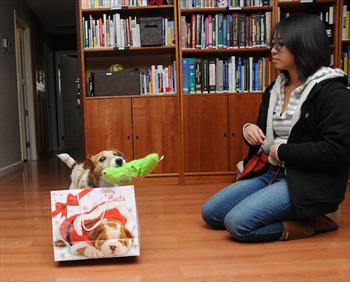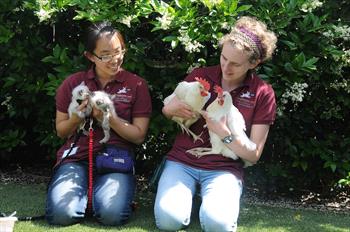During the course of my undergraduate degree in Animal Science, I quickly realized that working in a vet hospital setting wasn’t going to be my thing – but research was so cool! I discovered that I could study animal behaviour from an applied research perspective instead of becoming a veterinarian. This was in great part due to an incredible mentor, veterinarian, and applied animal behaviourist, Dr Sophia Yin. Not only did Dr Yin let me assist in her research projects and private consultations, she also encouraged me to take on as many outside learning opportunities as I could fit in: training wild mustangs (brumbies) in New Mexico, attending applied animal research conferences, foster-raising service dog puppies, running an independent research project, becoming a certified professional dog trainer, even attending a week-long scent-dog training workshop in Sweden. If it was remotely related to my interests, she thought I should be there, and helped make it happen.
As my undergraduate career came to a close, I knew that I wanted to continue on to get my PhD in something animal-related. The plan was to take a gap year (or two), and get some ‘life-experience’ and develop my Statistics skills by getting my Masters in Applied Statistics. About two weeks into my first semester of online classes through Pennsylvania State University, I was perusing Facebook (of course…) and spied a call for PhD applicants that sounded like it was written just for me. Dr Pauleen Bennett, Director of the Anthrozoology Research Group was looking for a PhD student to study scent-detection dogs and predictive measures of a successful working dog at La Trobe University’s Bendigo campus. Technically, the PhD would be in Psychology, but the topic of research was right up my alley. Pauleen and her research team had been on my radar for years but…what/where was La Trobe University? And where was Bendigo? Once my discussions with Pauleen got serious, my family and friends grew concerned. I’d be crossing the world for this opportunity and, of course, they wanted to know I’d be landing in a safe and encouraging place. After going through the admissions process, I received not only an acceptance into the program, but also a La Trobe University Postgraduate Research Scholarship and Fee Remission Research Scholarship. It seemed too good to be true!
Now that I’m four months in, I can officially report that it is indeed very good and very true!
I am actually working with the real Dr Pauleen Bennett and her research team. Even better, everyone I’ve met at La Trobe has been very welcoming and supportive. So far, it’s been mostly about adjusting to life in Australia and getting used to ‘living’ my PhD (a.k.a. spending every waking minute thinking about all the different things I want to do and how they can become a cohesive story in my eventual thesis). So, the simple answer to why I’m currently freezing my butt off here in Australia while my family enjoys a summer trip to the lake? This is a once-in-a-lifetime opportunity, and I am so glad to be on this fantastic adventure!
This post appeared originally at La Trobe University’s RED Alert blog.
Biography
Feng grew up in the San Francisco Bay Area and studied Animal Behaviour, Applied Statistics, and Psychology at the University of California, Davis. She recently made the move to Australia to begin her first year as a postgraduate researcher. She is studying anthrozoology, the science of humans and animals, in the Department of Psychology at La Trobe University’s Bendigo campus. She spent 4 years working with Dr. Sophia Yin, noted author and specialist in animal behavior.
In her free time, Lynna enjoys playing with puppies, dancing, and dabbling in amateur pet photography.





